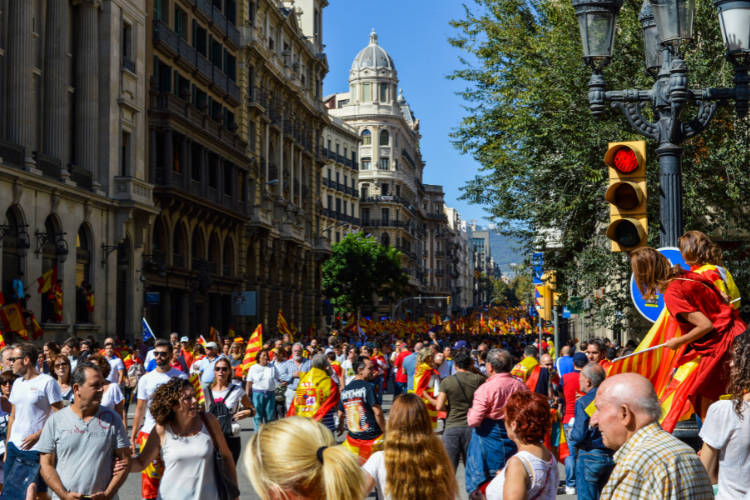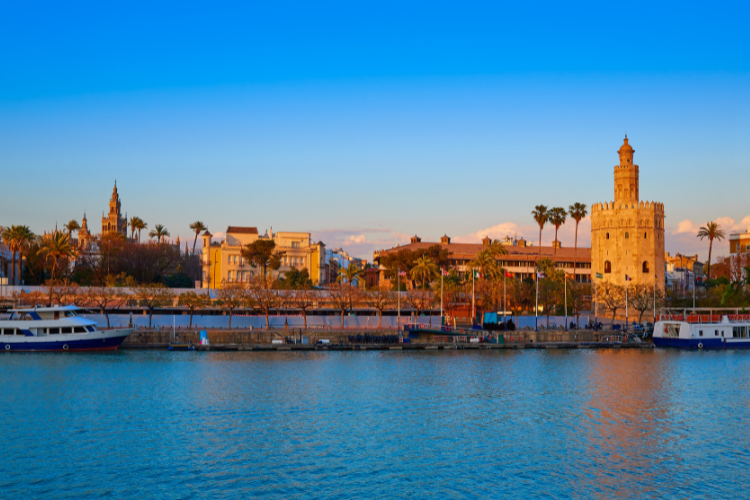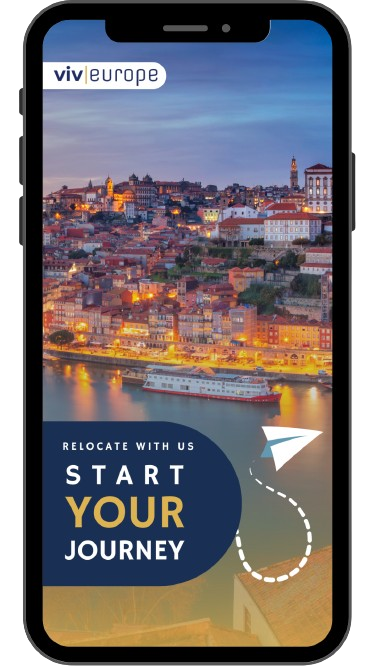Last Updated on November 8, 2024 by Laila Oliveira
If you’re considering moving to Portugal, you don’t have to limit your options to the continental region of the country. Islands like Madeira, located right in the heart of the Atlantic Ocean, are great options to live around plenty of sunshine and a relatively cheaper cost of living. But like every place, there are many pros and cons of moving to Madeira.
For most of our readers and clients, the pros outweigh the cons any day. However, it’s important to stay informed. This guide will discuss the cost of living, climate, job opportunities, and overall lifestyle!
Continue reading to make an informed decision about moving to Madeira!
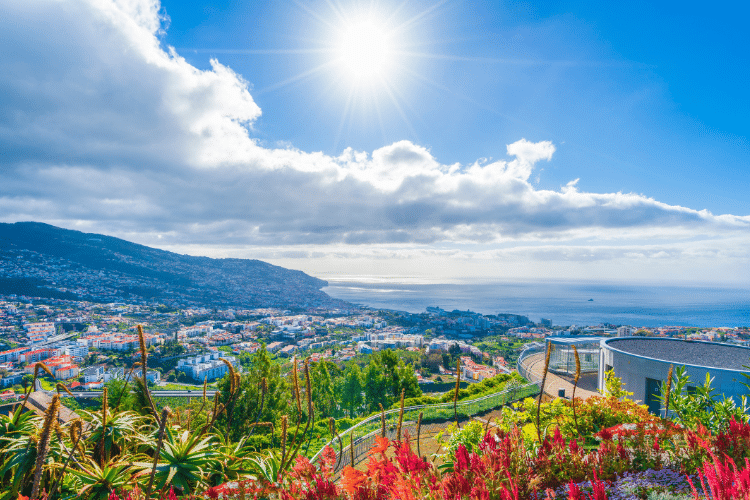
What is it like living in Madeira?
Living in Madeira is akin to experiencing a dream of tranquillity, surrounded by nature and serenity, all while enjoying the modern comforts of life. The locals are friendly, and the expat community is thriving.
Think about living the rest of your days in delightful temperatures, relishing scrumptious outdoor meals. This charming Portuguese island, situated 1077 km (669 miles) from the mainland in the middle of the Atlantic Ocean, has gained increasing global recognition.
Part of the reason for this newfound popularity is that expats and tourists are discovering the beauty and luxury of this rather small and remote island. Also, Madeira is the home of the soccer superstar Christiano Ronaldo.
Who lives in Madeira?
Madeira is the largest island in the greater Archipelago, taking about 741 km2 (286 sq mi). This expanse is home to over 250,000 local and expat legal residents. It is worth mentioning that over half of the population is in the capital Funchal.
About 67% of the population is made up of working-class citizens who are mainly located in the capital. Foreign presence in the country stands at 4.1%, according to data provided by Pordata. However, the exact foreign population in the regions often tends to be larger than reported on paper.
Why are expats moving to Madeira?
Madeira boasts both advantages and disadvantages, with one notable advantage being its trendy appeal as a favored destination for tourists and expats. This is primarily due to the numerous ongoing benefits it offers.
While it has long been celebrated as a top-notch tourist spot, this destination is also quite popular among digital nomads who take advantage of the good internet and different coworking spaces in the city and beyond.
Some other things that have proven to be a major draw for foreigners include:
- Residency programs that make relocation easier
- Tax Benefits for Non-Habitual Residents
- Buying a house as a real estate investment
- Lower cost of living than European cities
- It’s halfway between the United States and the United Kingdom
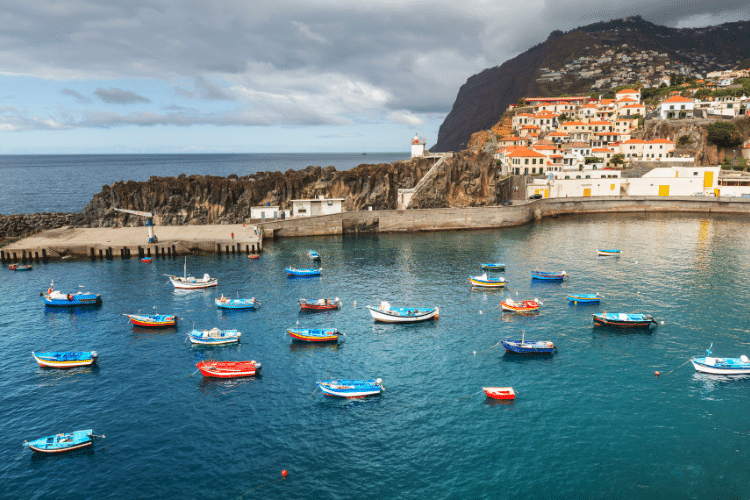
Pros of living in Madeira
If you’re looking to relocate, Madeira ranks pretty high as one of the top destinations to move within Portugal. The breathtaking landscape, pleasant climate, and relatively relaxed way of life are just a few reasons you should consider this move. That said, let’s look at the advantages of moving to Madeira.
Climate
Portugal is known for having arguably the best weather in Europe, and the island of Madeira is not so different. Madeira has a mild, subtropical climate that is influenced by its location in the Atlantic Ocean. The climate is characterized by relatively stable and pleasant temperatures throughout the year. Winters in Madeira are mild and comfortable.
The average temperatures typically range from 17°C to 20°C (63°F to 68°F) during the day, with slightly cooler evenings. Summers, on the other hand, are as expected; the average daytime temperatures range from 24°C to 28°C (75°F to 82°F).
The sea breeze helps keep the coastal areas cooler. Overall, Madeira’s climate is one reason why it is a popular tourist destination and an attractive place to live.
The pleasant year-round weather, with warm summers and mild winters, makes it an inviting spot for those seeking a comfortable and enjoyable environment.
Lower cost of living
One of the main draws for expats and tourists to Portugal is the relatively lower cost of living. You will be delighted to discover that Madiera is one of the most affordable destinations in Portugal. According to recent data from Numbeo, the cost of rent is about 65% lower than in Lisbon, while the cost of groceries is about 31% lower.
Other utility bills like electricity, mobile internet, and transport are also expected to be lower than in most other popular cities in Portugal. The capital, Funchal, is the island’s economic hub and is expected to be the most expensive destination. However, while this might be the case, living in Funchal is still about 15% cheaper than living in Lisbon.
Better quality of life
The quality of life in Madeira is generally considered to be quite high, making it an appealing destination for residents and visitors alike. Madeira’s stunning natural landscapes, including lush forests, dramatic cliffs, and picturesque coastlines, provide a beautiful backdrop for daily life.
The island’s natural beauty offers numerous opportunities for outdoor activities, such as hiking, swimming, and enjoying nature reserves.
Also, Madeira has a rich cultural heritage, and residents can engage in various traditional events, festivals, and cultural activities. The temperate weather allows residents to enjoy outdoor activities and a relaxed lifestyle.
Lastly, Madeira is known for its laid-back and slower pace of life compared to bustling cities. This can be attractive to those seeking a more peaceful and stress-free lifestyle.
The island lifestyle
If you’re looking for something different from the busy city life, you will love the island lifestyle of Madeira. Madeira has a rich cultural heritage, and locals take pride in preserving their traditions.
Traditional festivals, music, and local cuisine are integral to the island’s culture. Madeira hosts numerous festivals and events annually, celebrating everything from religious traditions to arts, music, and local products.
You will also get to appreciate fresh Portuguese cuisines, which are primarily made up of seafood, thanks to the proximity to the sea. Living on an island also encourages a greater appreciation for simple pleasures, such as watching a sunset over the ocean, strolling through scenic landscapes, or spending time with loved ones.
The beaches
Madeira has beautiful beaches, but they differ from the typical sandy beaches you might find in other tropical destinations. Madeira’s coastline is characterized by rugged cliffs and rocky shores, meaning that the island’s beaches mostly comprise pebbles, rocks, and volcanic formations.
While they may not have long stretches of golden sand, Madeira’s beaches offer their own unique charm and natural beauty.
The clear blue waters of the Atlantic Ocean contrast with the dark volcanic rocks, creating picturesque and dramatic coastal landscapes. Some beaches may have small patches of imported sand to enhance comfort, but the natural features remain prominent. Some of the most popular beaches in this region include; Praia Formosa, Praia do Porto Santo, and Praia da Calheta.
Let’s Move to Europe
With Viv Europe your plans for Europe will come to a reality
Beautiful nature
The island of Madeira boasts some of the most breathtaking natural landscapes worldwide, drawing travelers from all over the globe. The diversity of its nature stands out as a primary reason for people to choose this destination.
For those who revel in outdoor activities, Madeira becomes an ideal place to relocate, offering many options for hikes, walking trails, and watersports. The mountains and hiking trails provide awe-inspiring experiences, while the island’s panorama includes picturesque banana and sugarcane farms, as well as stunning views of the Atlantic Ocean in every direction.
It serves as an idyllic retreat for expats seeking complete relaxation, immersed in the lap of nature, and looking to unwind after a demanding workweek.
Cabo Girao is a must-visit for nature enthusiasts, with its distinction as the highest cliff in Europe, offering unparalleled views across the island. Another must-see location is the Levada forest, where you can indulge in the enchanting “The 25 Fountains Walk,” aptly named for the 25 waterfalls that grace the path.
Digital nomad community
Madeira is a magnet for digital nomads for all the right reasons. Ponta do Sol, a digital village in Madeira, attracts remote workers from all walks of life. This village provides many benefits for remote workers, for instance, free coworking spaces and events exclusive to digital nomads. This makes it easy for you to find like-minded individuals and network.
The Digital Nomad Village in Madeira receives thousands of applications every year and provides a space for individuals to connect and grow.
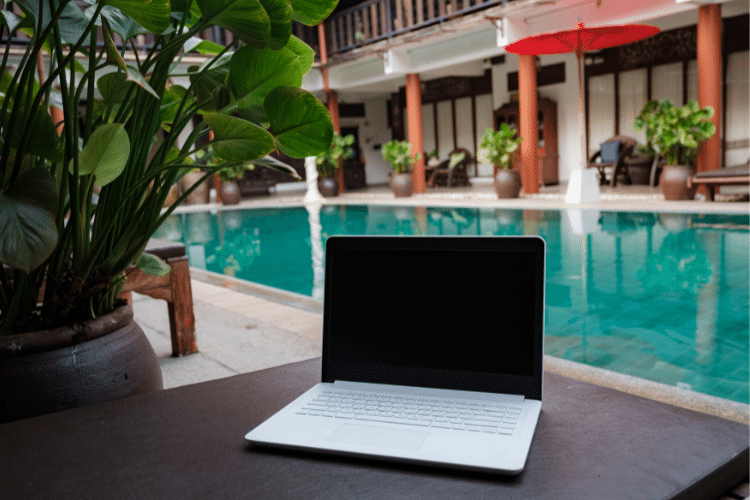
Cons of living in Madeira
There is no doubt that plenty of benefits come with moving to Madeira; however, just like any other destination worldwide, there are a few cons as well. Here is a detailed breakdown.
Learning Portuguese
While English is commonly used in the capital and the nearby environs, learning Portuguese could be challenging for expats considering moving to Madeira. It is advisable to have some basic knowledge of the local language when moving to a new country, as it facilitates independent navigation in the city.
Acquiring proficiency in Portuguese is recommended for expats to ease their daily life in Lisbon, whether it’s for grocery shopping, rent negotiations, or seeking directions. Although Portuguese is not the easiest language to learn, taking online classes will help you improve faster than you would have on your own.
Bureaucracy
Madeira’s bureaucratic processes present one of the drawbacks of the city, causing concern not only among foreigners but also among Portuguese residents. The paperwork and documentation tend to be slow and time-consuming, often compounded by unclear information.
Nevertheless, having a local companion can be beneficial in navigating through these procedures. We recommend preparing all necessary information beforehand and familiarizing yourself with the processes before commencing any tasks.
This approach will save considerable time and prevent the need to return to resolve unfinished matters. While scheduling appointments can be lengthy, you’ll grow accustomed to it.
Limited job opportunities
Unfortunately, the job market in Madeira tends to be smaller and more focused on specific sectors. Sectors such as tourism, hospitality, agriculture, and international business services.
While jobs are available in these areas, the options may be limited compared to larger cities or regions with more diverse economies. It’s essential to consider that Madeira is a popular tourist destination. Especially for European travelers, and as such, seasonal employment opportunities in the tourism sector may be more common.
Additionally, remote work and digital nomad opportunities were gaining traction in Madeira, offering the potential for individuals who can work remotely.
The slow pace of life
Although a fairly relaxed pace of life is often a major draw, particularly for retirees, it can be overwhelming for anyone who is used to having an active and vibrant life. However, while this is true, it is worth mentioning that you can easily get used to this life.
It can be too isolated
Because Madeira is located right in the heart of the Atlantic Ocean, it can feel somewhat isolated from the rest of the world. This destination is over one hour away from mainland Portugal by flight.
This can make it relatively more difficult to access things urgently from the continental part of the country. However, you will have most of the things you need in Madeira. The only difference will be delivery duration; you will have to wait longer for the things you order on the island.
Limited healthcare in some of the islands
Generally, Madeira has an excellent healthcare system, particularly around the capital Funchal. The hospitals are well equipped with enough staff to cater to the nearby population. However, the same cannot be said for the smaller remote islands. Such destinations within the island may have more limited healthcare facilities and services.
Access to specialized medical care and facilities may be more restricted in these remote areas posing challenges for residents or visitors requiring advanced medical treatment.
In cases where specialized medical care is needed, patients from the smaller islands may need to be transported to the main island of Madeira for treatment. This can sometimes lead to delays, particularly in emergencies.
When are you moving to Madeira?
There you have it, a detailed breakdown of the pros and cons of Madeira! We hope that this post has helped answer some questions that you may have about relocating permanently to Madeira.
We reckon that moving to a new country can pose different challenges, especially if it is your first time. Our experts at Viv Europe are more than happy to help make the transition easier for you.
If you have any further questions or inquiries, be sure to join our Facebook Group – All About Portugal For Expats, and interact with other expats who were once in the same position as you. Happy planning!



